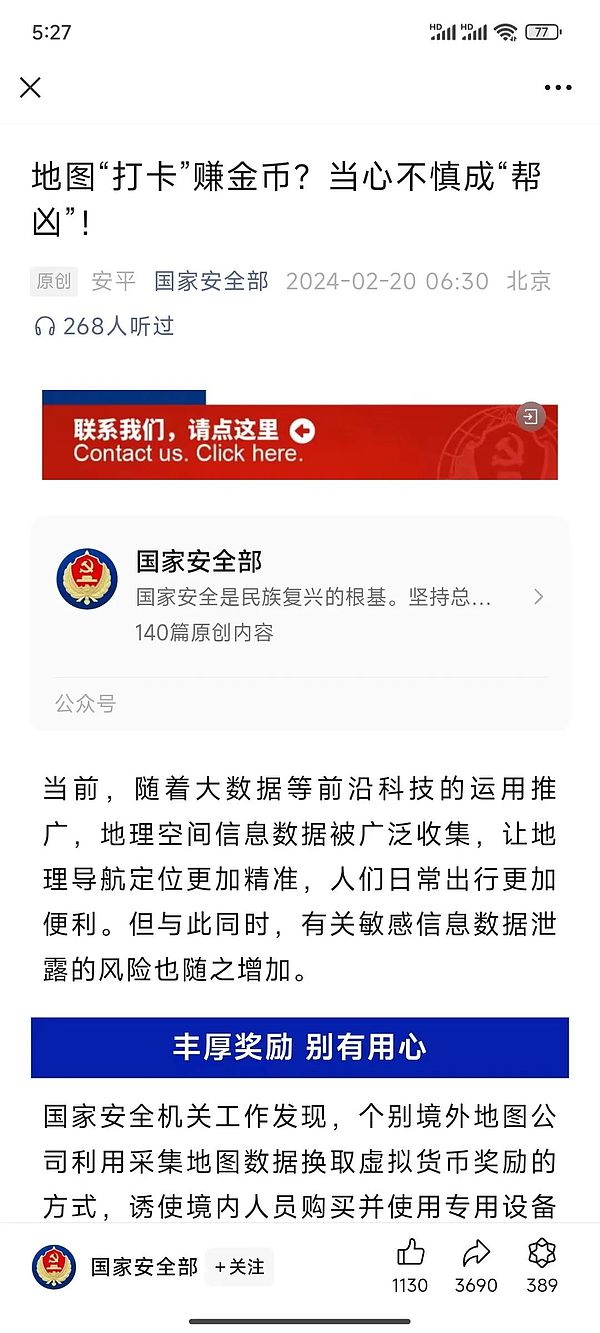Source: Lawyer Liu Honglin
01 Blockchain Supervision Dual Repeat
There are two important reasons why blockchain is sensitive in China.One is the financial risk caused by the issuance and speculation of virtual currency, and the other is the unlicensed transnational There are security risks in data transmission within the environment.
Because the currency speculation is so popular, domestic Web3.0 entrepreneurs are daily worried about the financial policy risks related to currency issuance, but it is easy to ignore the data that is more concerned from the national regulatory level. Safety. After all, what you lose in currency speculation is the people's personal money, and it is a matter of personal choice and preference. You will suffer the profits and losses yourself, and it will not affect the safety of others and society; but if participating in a blockchain project threatens the country It's safe, so there's nothing to say. Surgery is necessary.
There will be no pie in the sky, but the project side may have airdrops. "X to earn" is a universal tool for currency circle projects. In order to encourage users to attract new users and promote activity, many blockchain projects often adopt the method of "mining with rewards". But the mining here is not limited to Bitcoin mining, which consumes a lot of electricity, but the "proof of work" set by any project party. For this purpose, a category of work called token economics has been specially extended. Therefore, we can see the magical phenomenon of Token rewards for running, Token rewards for watching advertisements, and Token rewards for playing games. Some professional wool-gathering users will form wool-raising/gold-making studios to participate in tokens for various projects. Rewards and airdrops.
But not all Tokens can be earned.
02 Not all coins can be harvested
Recently, China's Ministry of National Security issued a document stating that some overseas map companies use the method of collecting map data in exchange for virtual currency rewards to induce domestic personnel to purchase and use special equipment to "check in" maps, illegally collect sensitive geospatial information data, and Upload to overseas servers in real time, and even offer high rewards for specific areas to attract "collectors" to focus on collection. Some people within the country have a weak awareness of national security and are tempted by the way of making money by checking in on maps. They are unknowingly used by overseas companies with ulterior motives and become "accomplices" in their illegal collection and theft of geospatial data.

Geospatial information data are production factors and data resources for economic and social development. Once sensitive information such as transportation networks, important infrastructure, and military facilities is leaked and subjected to technical analysis and processing, it will pose a serious threat to national security. The overseas companies and domestic individuals involved have not obtained qualifications for domestic surveying and mapping business in China, and the relevant data collection behavior is suspected of violating relevant provisions of the "Counterespionage Law", "Surveying and Mapping Law" and "Data Security Law".
For national security departments, overseas organizations may be beyond their reach, but blockchain players participating in the country are easily targeted. If you are suspected of breaking the law because of collecting hundreds or thousands of dollars of wool, you will be in a big loss.
According to the provisions of the "Counterespionage Law", overseas institutions, organizations, and individuals commit, instigate, and fund others to commit, or domestic institutions, organizations, and individuals collude with them to commit theft, espionage, bribery, and illegal provision of relationships. Data of national security and interests is an act of espionage; according to the "Surveying and Mapping Law", those engaged in surveying and mapping activities must obtain the corresponding level of surveying and mapping qualification certificates in accordance with the law. Foreign organizations or individuals engaging in surveying and mapping activities within the territory of our country must go through the relevant surveying and mapping authorities in conjunction with the Approval by the military surveying and mapping department shall not involve state secrets or endanger national security. According to the "Data Security Law", any organization or individual must collect data in legal and proper ways, and must not steal or obtain data through other illegal means.
In response to the above situation, the national security agencies, together with relevant functional departments, investigated and punished domestic and foreign personnel and enterprises that collected and stole China’s sensitive geospatial information data, promptly blocked the illegal export of relevant data, and eliminated the risk of relevant data leakage. Hidden danger. At the same time, citizens are reminded that if they discover illegal foreign-related geospatial information data collection activities and related suspicious situations, they should report it to the national security agencies in a timely manner and cooperate to assist in investigation and evidence collection.
03 Mankiw Lawyer Tips
Although blockchain There are no national borders, but every Internet user has his own country. The earth may be flat, but mainstream countries and regions are inconsistent with user privacy protection and data security management. Blockchain projects can certainly be launched in China, but they must comply with Chinese legal and regulatory requirements. In terms of the local legal system and understanding of regulatory authorities, local entrepreneurs in China will naturally have great advantages. Lawyer Hong Lin previously communicated with Yuan Jie of Conflux Tree Chain. He also mentioned this point. Under geopolitics, China must have its own leading public chain. For Chinese Web 3.0 entrepreneurs, they may not necessarily build a public chain, nor may they be able to issue coins, but compliance matters under Chinese law are indispensable.
With the compliance development of the Web3.0 industry, the issuance and trading of tokens will gradually become compliant and will be on the right track when it comes to addressing the compliance of virtual currency financial risks. , it will become increasingly urgent to solve the data security problems caused by the distributed storage of public blockchains.
 Huang Bo
Huang Bo









